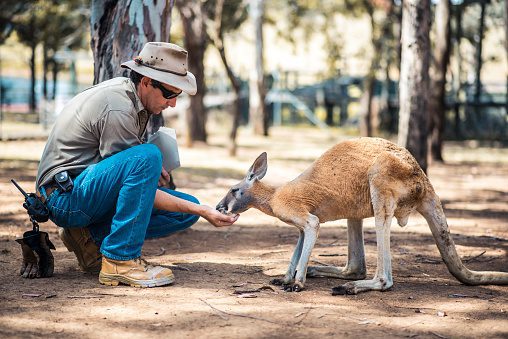
| Zoologist Key Stats | |
|---|---|
| Avg. Salary / year | $59,680 |
| Avg. Pay / hour | $28.69 |
| Education | 3-4 Years |
| Job Outlook | 5% |
Individuals who love working with animals may want to think about how to become a Zoologist or its similar counterpart, Wildlife Biologist.
The majority of this profession’s work time is spent studying animals and wildlife and how they interact with their environment, other living animals and ecosystem as a whole.
The ecosystem includes other wildlife and living organisms as well as nonliving elements, such as water, air and soil and how they all interact with one another.
Table of Contents
Education Requirements to Become a Zoologist
An individual who wants to become a Zoologist may enter the field at an entry level position.
If an individual would like to advance in this field, they need to acquire more experience and education.
In order for an individual to become a zoologist and secure an entry level position, they must first seek a bachelor’s degree from an accredited university or college.
At the entry level position, individuals have a variety of options in the major they study.
Depending on the availability of majors and classes, undergrads may choose to focus on the following majors: zoology, wildlife biology, ecology or biology with additional courses in zoology.
Students may also benefit from taking additional courses in ecology, anatomy wildlife management and cellular biology.
If an individual would like to focus on a certain type of species, such as, herpetology (reptiles and amphibians) or omithology (birds) they also have the option to take specialized courses in order to gain understanding in this specialization.
Because this profession is required to also understand an environment as a whole, i.e.
the ecosystem, students should also focus their studies on courses in physics, botany and chemistry to acquire a well-rounded scientific background.
In addition, students will need to take courses in statistics and mathematics to help them analyze complex data.
Individuals wanting to advance their careers would benefit from pursuing a graduate degree.
Securing a master’s degree in zoology will help candidates secure a high level position.
For those willing to continue to further their education, they can work towards gaining a Ph.D.
Completing this advanced degree will assist individuals who want to run their independent research or for those attempting to secure a research position at the university level.
Zoologist Job Description
As a profession, Zoologists focus their time on studying and analyzing animals and how they interact with their environment.
This may also include how humans and their lifestyle habits affect wildlife and natural habitats.
Specific job duties can include studying animals in their natural surroundings or in a controlled environment.
Because some individuals study animals in the natural environments, Zoologists are required to spend a lot of time outdoors and at specific sites that their employers assign.
During a Zoologist’s time outdoors, they will collect biological data and specimens to be analyzed and studied in a lab.
An analysis may also include written observations documented by a Zoologist in the field.
These observations include the physical characteristics of the wildlife being examined, interactions with other animals, movement patterns, reproduction and diseases.
Zoologists will document their findings by writing research papers, reports and scholarly articles.
Zoologists are also involved in providing expert advice and recommendations on conservations efforts to the general public and policymakers.
The majority of Zoologists work on research teams with professionals specializing in other areas.
For example, Zoologists studying the effects of water pollution may work with other professionals, such as environmental scientists or hydrologists.
Zoologists wanting to specialize in a specific species have the option of choosing some of the following specialties:
- Cetologists: study marine mammals
- Herpetologists: study reptiles and amphibians
- Ichthyologists: study wild fish
In addition, Zoologists may specialize in a specific locale or environment:
- Limnologists: focus on wildlife that live in freshwater
- Terrestrial biologists: focus on species that live saltwater
Zoologist Salary and Career Path
The median annual pay for Zoologists and Wildlife Biologists was $57,710 in 2012.
The hourly rate for this profession was $27.74 in the same year.
An individual’s income will depend greatly on the industry they work in or agency who has hired them.
The federal government is the sector that pays the highest at $72,700 per year.
While higher education institutions pay a median annual income of $55,610 and State governments paying the lowest income at $51,780 per year.
Individuals who are fond of nature and wildlife can make a great living out of being a Zoologist.
The work these professionals do also has a bigger impact on humanity since their findings also help other professions and the public understand wildlife and the importance of preservation in our current society.
Animal lovers would be making a wise choice in choosing this job as a profession.
![]() The below information is based on the 2021 BLS national averages.
The below information is based on the 2021 BLS national averages.
National Average Salary
$70,300Average Salary by State
| State | Avg. Annual Salary |
|---|---|
| Alabama | $59,680 |
| Alaska | $82,450 |
| Arizona | $63,390 |
| Arkansas | $60,260 |
| California | $78,390 |
| Colorado | $73,260 |
| Connecticut | $72,190 |
| Florida | $53,080 |
| Georgia | $64,160 |
| Hawaii | $78,140 |
| Idaho | $68,190 |
| Illinois | $66,600 |
| Indiana | $55,240 |
| Iowa | $63,320 |
| Kansas | $58,350 |
| Kentucky | $56,290 |
| Louisiana | $71,050 |
| Maine | $60,530 |
| Maryland | $81,170 |
| Massachusetts | $92,830 |
| Michigan | $72,370 |
| Minnesota | $68,450 |
| Mississippi | $73,860 |
| Missouri | $69,210 |
| Montana | $68,060 |
| Nebraska | $56,770 |
| Nevada | $68,350 |
| New Hampshire | $65,800 |
| New Jersey | $85,730 |
| New Mexico | $61,920 |
| New York | $76,020 |
| North Carolina | $66,930 |
| North Dakota | $73,330 |
| Ohio | $61,760 |
| Oklahoma | $58,590 |
| Oregon | $77,370 |
| Pennsylvania | $66,940 |
| South Carolina | $56,020 |
| South Dakota | $57,960 |
| Tennessee | $69,920 |
| Texas | $77,330 |
| Utah | $59,380 |
| Vermont | $72,440 |
| Virginia | $70,710 |
| Washington | $81,310 |
| Wisconsin | $61,110 |
| Wyoming | $65,570 |
The top earning state in the field is Massachusetts, where the average salary is $92,830.
These are the top 5 earning states in the field:
* Employment conditions in your area may vary.
Frequently Asked Questions
What does a zoologist do?
A zoologist is someone who studies the genetics, diseases, origins, behaviors, and life progression of animals.
Zoology is an extremely broad field, and a professional can dedicate his or her life to studying one specific species or a group of species; study animals in a zoo or their natural habitat, and so on.
Of course, the main aims of a zoologist will vary as well; some might choose to protect endangered species and preserve natural habitats, while others might be managing wildlife’s adjustment to the changing climate.
There are a lot of different types of zoologists – primatologists, ethologists, paleozoologists, wildlife biologists, mammalogists, herpetologists, entomologists, ornithologists, cetologists, etc.
Zoologists can work as professors, in a lab-based environment, or outdoors.
How much do zoologists make?
On average, a zoologist can make a little more than $63.000 per year in the United States.
In case you decide to follow this career path, you can expect to earn anywhere between $40.000 and $103.000 annually.
The salary would certainly depend on a variety of factors – your education and experience level, the employer, the location and so on.
The zoologists that work in the District of Columbia, Connecticut, and Massachusetts, for example, have the highest average salaries.
An entry-level zoologist can earn $19 per hour, while a specialist with plenty of experience will make $49 and more.
How much does it cost to become a zoologist?
You would certainly need a bachelor’s degree in zoology, in order to apply for an entry-level or a mid-level position.
A year in a university can cost you anywhere between $8.000 and $45.000 (and more); the cost depends on a variety of factors (the books, supplies, and accommodation expenses are not included).
However, the majority of employers will prefer you to have a master’s degree (over $11.000) or a doctorate degree, in case you want to become a professor or focus on independent research in zoology (a Ph.D. will cost you around $20.000 per year).
What is the demand for zoologists?
Between 2016 and 2026, the zoologist job market is expected to grow by 7.7%, according to the Bureau of Labor Statistics.
That is as fast as the national average for all occupations in the United States.
The public will become more interested in eliminating the hazards facing the environment and the living organisms of our planet in the near future, so zoologists might be required to focus on this field.
The candidates that hold a master’s or doctorate degree and have plenty of experience will have better job prospects.
The industry is mainly concentrated in California, Florida, and Washington.
How long does it take to become a zoologist?
It will take you 4 years to obtain a bachelor’s degree and another 2 years to earn a master’s degree.
A doctorate degree typically takes 5-6 years to acquire.
Volunteering at various organizations and seeking internship opportunities will be extremely helpful for your future career.













